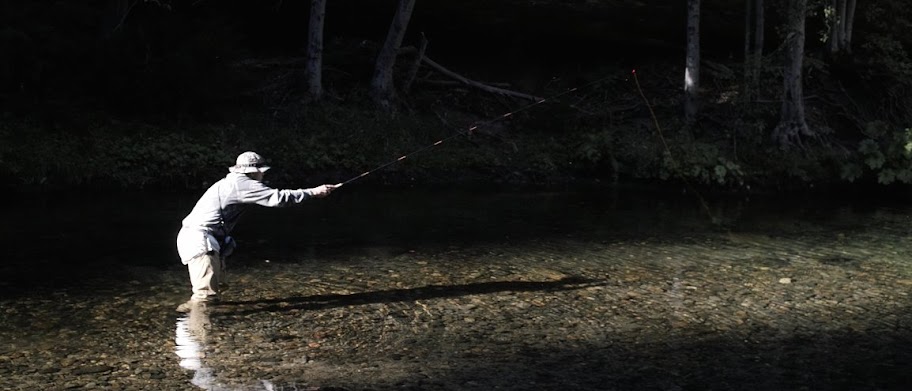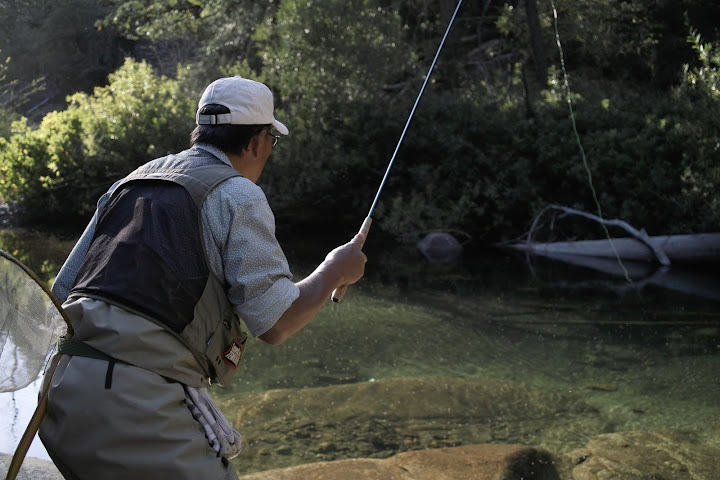Archive for the ‘History’ Category
Kebari Tsuri And the origin and meaning of the name Tenkara
Very often people ask me what the name tenkara means. When someone familiar with Japanese reads the name in Roman characters (tenkara), and not in the katakana characters it is usually written with (テンカラ), they read it as if it meant “from heaven”. The sound ten is usually “heaven or sky”, kara mean “from”. However, use of the katakana system of writing gives them an indication that it may mean something else. How, exactly, the name originated, nobody knows, though I do know how it became popular and what it actually means.
Even in Japan, where tenkara originated, the vast majority of the non-fishing population has never heard of tenkara, and have no idea what tenkara is – though most people here know fly fishing, I am still surprised when I mention “fly fishing” to someone in the US and they don’t know really know what it is, Tenkara is popular in some areas, what I call “pockets” in Japan. People in these areas and mountain stream fishermen know it, but the general population doesn’t.
Tenkara was not always “tenkara” everywhere in Japan. Before it was widely known as “tenkara” throughout Japan, this method of mountain stream fishing was most commonly known as “kebari tsuri”. You see, “tsuri” is the Japanese word for fishing. “Kebari” literally means “feathered/haired hook”, and is the word for an artificial fly. Japan has a lot of mountains, and valleys. These valleys can relatively isolated by the high mountains, and thus different dialects exist.

If someone asked the Tenkara Bum, "where does the fish think the fly came from?". He would say "from the sky". If the person asked him how he was catching so many fish, he would reply "tenkara".
In a few of these mountain stream areas this method of fishing was known as tenkara from the beginning. There are several theories for how the name came about, though no one will ever know for certain. Fujioka-san gives a good description of the theories for the name’s origin in his site. One of the theories he does not cover, but is also widely accepted, is that one day a professional tenkara fisherman was casting his fly around a stream and catching a lot of fish. Someone not familiar with the method approached him and asked, “what kind of fishing is this?” or something about the type of fishing, the original tenkara angler misunderstood the question for “how are you catching so many fish?. The tenkara angler, misunderstanding his question, replied that the “the fish sees the fly coming from the sky – ‘tenkara‘… and bites it.” And so the word spread around that area. In other areas, people not familiar with the story just kept calling it “kebari tsuri“, until…
This fish saw the fly approaching from the sky.
When Dr. Ishigaki, my sensei, started getting interested in tenkara about 40 years ago, there was almost no information written or available. He found one book that talked of “kebari tsuri” and gave a few pointers on the method. As he started devoting his time to researching fishing and tenkara, he was put in touch with many of the tenkara masters of the day. Some called it tenkara, others kebari tsuri. Suddenly, and in large part because of some research he started doing, articles he wrote for different magazines, and an appearance at one of the largest TV shows in the country, there was a resurgence in interest for tenkara in Japan. Along with these masters and new friends, the word of choice for describing the traditional Japanese method of mountain stream fly-fishing, became tenkara. In part because it was shorter, part because it sounded more traditional and, I suspect, in large part to distinguish it from other types of fishing that used a “feathered hook”.
So, what does tenkara mean? Tenkara means the “traditional Japanese method of mountain stream fly-fishing where only a rod, line and fly are used”. It is a very narrowly defined word exclusively used for this method of fishing, to distinguish it from the dozens of others practiced in Japan.

This is tenkara, period.
Written by tenkarausa
February 25, 2011 at 7:20 pm
Posted in About Tenkara, History
Tagged with fly-fishing, kebari tsuri, mountain stream, mountain stream fly fishing, tenkara fly, tenkara name, what does tenkara mean, what is tenkara